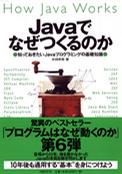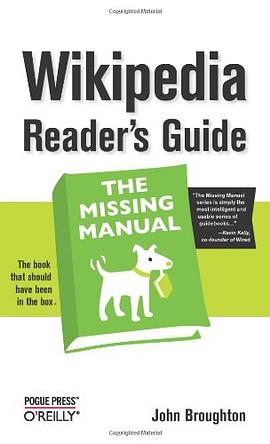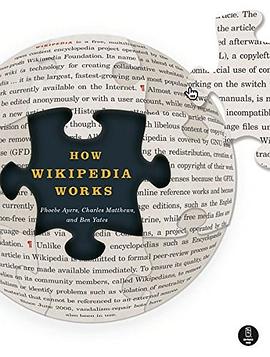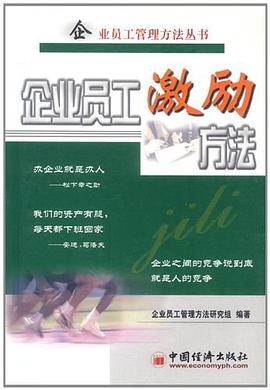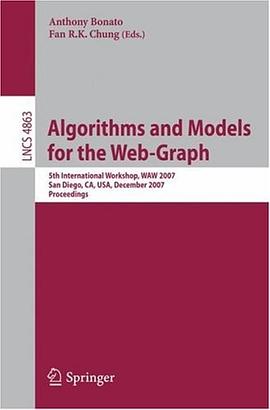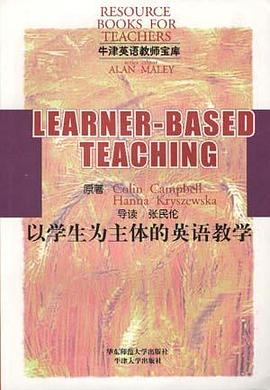

具体描述
作者简介
目录信息
Contents
The authors and series editor
Foreword
Introduction
How to use this book
Activity Language focus
1 Grammar exercises and drills
1.1 Decisions
1.2 From ' a' to ' the
1.3 1 know what my
teacher has done
1.4 Random comparisons
1.5 Character building
1.6 My country/district
1.7 Controversial questions
1.8 The wonderful world of
inventions
1.9 Is that right?
1.10 My grammar problem
Mixed conditionals
Use of articles
Present perfect
Comparative adjectives
Simple present
'Can' (possibility)
Passive in simple past
Talking about past
events
Confirming
Learners' problems
2 Vocabulary
2.1 Dr Jekyll and Mr Hyde
2.2 Beat the expert
2.3 Telephone numbers
2.4 Make your own picture
dictionary
2.5 Finish my family tree
2.6 Random phrasal verbs
2.7 The merry alphabet
2.8 What shall we eat?
2.9 What's gone?
2.10 Five favourite words
Adjectives of character
and physique
Expansion of topic
vocabulary
Numbers and telephone
language
Identifying lexical gaps
in easy-to-draw lexical
fields
Families and ' have
got'
Phrasal verbs
Vocabulary activation
and expansion
Names of food
products, and giving
instructions
Names of everyday
objects and raw
materials
Revising vocabulary
3 Integrated skills
3.1 The Daily Gutter Language of discussion
and interviews
3.2 Start your own business Talking about skills,
language of advertising
3.3 Draw the simple present Names of objects,
spatial prepositions,
simple present
3.4 Invent your own country Revision of simple
3.5 Robots
3.6 Job interviews
3.7 School reports
3.8 Holiday precautions
3.9 Do you recognize your
home?
3.10 Arguments
present, simple past, and
present perfect
Instructions and
discussion
CVs, talking about
qualifications,
interviewing
Revision of functions,
register
Giving warnings,
stating precautions
Describing homes
Language of discussion,
putting forward
arguments
4 Writing
4.1 Dictionary of
4.2 The shortest review
4.3 What would you like
to know?
4.4 What's the news today?
4.5 How much do we
really know?
4.6 Whose life?
4.7 My great-, great-,
great-
Topic vocabulary,
definitions, dictionary
entries
Organization of a
paragraph, linking words,
paraphrasing
Organizing information
Language of headlines,
expressing attitudes
Organizing information
Writing biographies
Describing people and
past events
4.8 The review of the
decade
4.9 Fictional agony column
4.10 Number poetry
Negotiating, organizing
information
Describing problems,
giving advice
Playing with words
5 Translation
5.1 Telephone call
5.2 My favourite numbers
and dates
5.3 My story?
5.4 What is your text about?
5.5 How long will you
manage?
5.6 Silent conversation
5.7 Home becomes England
5.8 Message passing
5.9 Collective cultural
consciousness
5.10 Do you know this
song?
Everyday exchanges
Numbers, dates, simple
present and simple past
Giving the gist
Scanning, asking and
answering questions
Answering questions
Dialogue building
Language of signs and
notices
General fluency practice,
sentence structure
Language of poetry
Giving the gist,
summarizing
6 Games
6.1 Mastermind
6.2 Presents
6.3 Drawing prepositions
6.4 Irregular verbs match
Asking questions
Describing people and
objects, persuading
Spatial prepositions,
giving instructions
Irregular verbs
6.5 Effective shopping
6.6 Travel quiz
6.7 The 'why' game
6.8 The chat show
6.9 Tennis
6.10 Invent a game
Language of shopping,
describing objects
Simple present, times,
prices
Asking questions
Asking questions, espe-
cially in the simple past
'Weall', 'Allofus',
' None of us'
Giving instructions
7 Exam preparation
7.1 Ideal classroom
7.2 Our dialogue
7.3 What's in the picture?
7.4 What do you mean?
7.5 We test you, you test us
7.6 Letters
7.7 Listening comprehension
7.8 Cloze test
7.9 Contextualizing the
question
7.10 Word building
Planning and talking
about a picture, spe-
culating, giving reasons
Open dialogue, predict-
ing, appropriacy,
reference
Talking about a picture,
spatial arrangement
Structural reformulations
Writing tests
Grammar revision
Writing questions and
listening comprehension
texts
Grammar revision
Speed reading, intensive
reading
Families of words,
grammar categories
8 How to think learner-based teaching
8.1 Teacher-based learning
8.2 Planning a lesson: 1
8.3 Planning a lesson: 2
Introducing learner-based teaching into your classroom
· · · · · · (收起)
The authors and series editor
Foreword
Introduction
How to use this book
Activity Language focus
1 Grammar exercises and drills
1.1 Decisions
1.2 From ' a' to ' the
1.3 1 know what my
teacher has done
1.4 Random comparisons
1.5 Character building
1.6 My country/district
1.7 Controversial questions
1.8 The wonderful world of
inventions
1.9 Is that right?
1.10 My grammar problem
Mixed conditionals
Use of articles
Present perfect
Comparative adjectives
Simple present
'Can' (possibility)
Passive in simple past
Talking about past
events
Confirming
Learners' problems
2 Vocabulary
2.1 Dr Jekyll and Mr Hyde
2.2 Beat the expert
2.3 Telephone numbers
2.4 Make your own picture
dictionary
2.5 Finish my family tree
2.6 Random phrasal verbs
2.7 The merry alphabet
2.8 What shall we eat?
2.9 What's gone?
2.10 Five favourite words
Adjectives of character
and physique
Expansion of topic
vocabulary
Numbers and telephone
language
Identifying lexical gaps
in easy-to-draw lexical
fields
Families and ' have
got'
Phrasal verbs
Vocabulary activation
and expansion
Names of food
products, and giving
instructions
Names of everyday
objects and raw
materials
Revising vocabulary
3 Integrated skills
3.1 The Daily Gutter Language of discussion
and interviews
3.2 Start your own business Talking about skills,
language of advertising
3.3 Draw the simple present Names of objects,
spatial prepositions,
simple present
3.4 Invent your own country Revision of simple
3.5 Robots
3.6 Job interviews
3.7 School reports
3.8 Holiday precautions
3.9 Do you recognize your
home?
3.10 Arguments
present, simple past, and
present perfect
Instructions and
discussion
CVs, talking about
qualifications,
interviewing
Revision of functions,
register
Giving warnings,
stating precautions
Describing homes
Language of discussion,
putting forward
arguments
4 Writing
4.1 Dictionary of
4.2 The shortest review
4.3 What would you like
to know?
4.4 What's the news today?
4.5 How much do we
really know?
4.6 Whose life?
4.7 My great-, great-,
great-
Topic vocabulary,
definitions, dictionary
entries
Organization of a
paragraph, linking words,
paraphrasing
Organizing information
Language of headlines,
expressing attitudes
Organizing information
Writing biographies
Describing people and
past events
4.8 The review of the
decade
4.9 Fictional agony column
4.10 Number poetry
Negotiating, organizing
information
Describing problems,
giving advice
Playing with words
5 Translation
5.1 Telephone call
5.2 My favourite numbers
and dates
5.3 My story?
5.4 What is your text about?
5.5 How long will you
manage?
5.6 Silent conversation
5.7 Home becomes England
5.8 Message passing
5.9 Collective cultural
consciousness
5.10 Do you know this
song?
Everyday exchanges
Numbers, dates, simple
present and simple past
Giving the gist
Scanning, asking and
answering questions
Answering questions
Dialogue building
Language of signs and
notices
General fluency practice,
sentence structure
Language of poetry
Giving the gist,
summarizing
6 Games
6.1 Mastermind
6.2 Presents
6.3 Drawing prepositions
6.4 Irregular verbs match
Asking questions
Describing people and
objects, persuading
Spatial prepositions,
giving instructions
Irregular verbs
6.5 Effective shopping
6.6 Travel quiz
6.7 The 'why' game
6.8 The chat show
6.9 Tennis
6.10 Invent a game
Language of shopping,
describing objects
Simple present, times,
prices
Asking questions
Asking questions, espe-
cially in the simple past
'Weall', 'Allofus',
' None of us'
Giving instructions
7 Exam preparation
7.1 Ideal classroom
7.2 Our dialogue
7.3 What's in the picture?
7.4 What do you mean?
7.5 We test you, you test us
7.6 Letters
7.7 Listening comprehension
7.8 Cloze test
7.9 Contextualizing the
question
7.10 Word building
Planning and talking
about a picture, spe-
culating, giving reasons
Open dialogue, predict-
ing, appropriacy,
reference
Talking about a picture,
spatial arrangement
Structural reformulations
Writing tests
Grammar revision
Writing questions and
listening comprehension
texts
Grammar revision
Speed reading, intensive
reading
Families of words,
grammar categories
8 How to think learner-based teaching
8.1 Teacher-based learning
8.2 Planning a lesson: 1
8.3 Planning a lesson: 2
Introducing learner-based teaching into your classroom
· · · · · · (收起)
读后感
评分
评分
评分
评分
评分
用户评价
评分
评分
评分
评分
评分
相关图书
本站所有内容均为互联网搜索引擎提供的公开搜索信息,本站不存储任何数据与内容,任何内容与数据均与本站无关,如有需要请联系相关搜索引擎包括但不限于百度,google,bing,sogou 等
© 2025 book.quotespace.org All Rights Reserved. 小美书屋 版权所有






